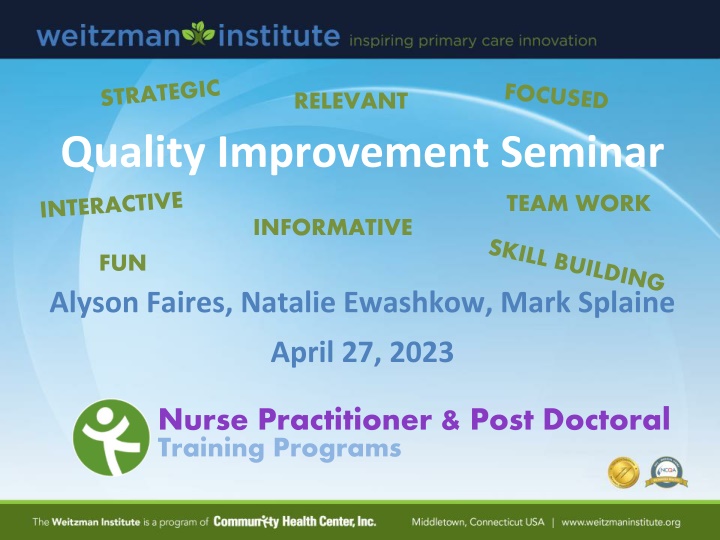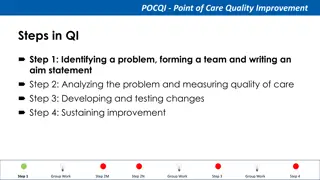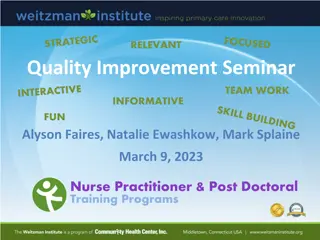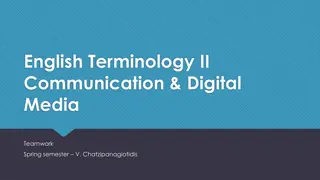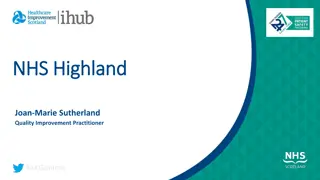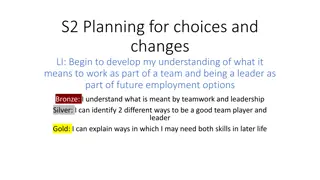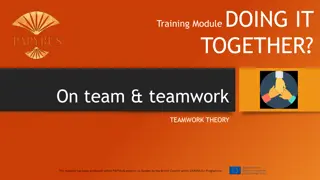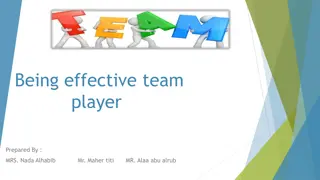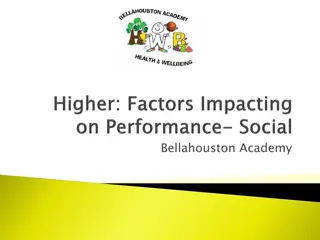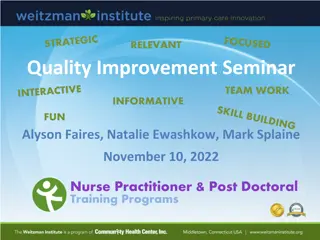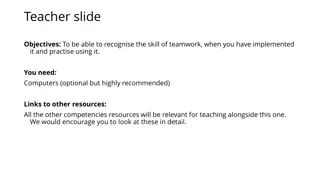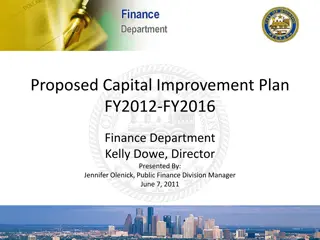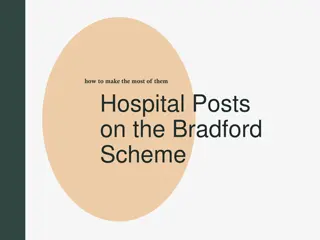Quality Improvement Seminar Teamwork & Curriculum Plan
Join Alyson Faires, Natalie Ewashkow, and Mark Splaine in an informative and fun seminar on Quality Improvement. Discover negotiation skills, PDSA cycles, and upcoming sessions. Learn about roles, agenda, and the curriculum plan. Get ready for team presentations and an engaging discussion. Enhance your skills and knowledge in a collaborative environment.
Download Presentation

Please find below an Image/Link to download the presentation.
The content on the website is provided AS IS for your information and personal use only. It may not be sold, licensed, or shared on other websites without obtaining consent from the author.If you encounter any issues during the download, it is possible that the publisher has removed the file from their server.
You are allowed to download the files provided on this website for personal or commercial use, subject to the condition that they are used lawfully. All files are the property of their respective owners.
The content on the website is provided AS IS for your information and personal use only. It may not be sold, licensed, or shared on other websites without obtaining consent from the author.
E N D
Presentation Transcript
RELEVANT Quality Improvement Seminar TEAM WORK INFORMATIVE FUN Alyson Faires, Natalie Ewashkow, Mark Splaine April 27, 2023 Nurse Practitioner & Post Doctoral Training Programs
Session Goals To learn from your application of negotiation skills To continue and deepen our discussion about PDSA cycles Hone your skills using experience from changes you have likely experienced To look ahead and discuss some upcoming sessions in our seminar series 2
Roles Guest Presenter Nicole Group Discussion Moderators Alyson, Natalie, & Mark Timekeeper Natalie Technical genius Meaghan Take-home thoughts report-out Alyson 3
Agenda Examples of your negotiations (15 mins) Nicole s reflections (10 mins) PDSA cycles common challenges and how to address them discussion (20 mins) Reminder about helpful resources (5 mins) Looking ahead (5 mins) Break (5 mins) Small Group Project Work (30 mins) 4
Curriculum Plan An overview of Quality Improvement (10/13/22) Care Observations & Stakeholder Considerations (10/27/22) Organizing your Improvement Project (11/10/22) Global Aim and Fishbone Diagram (12/8/22) Process Mapping (Flowcharts) (12/22/22) Measurement to Inform Change (1/12/23 & 1/26/23) An Approach to Testing a Change (2/9/23) Communication about your Improvement Effort (2/23/23) Stakeholder Analysis & Conflict Management (3/9/23) Managing Up and Gaining Leadership Buy-In (3/23/23) Negotiation (4/13/23) Negotiation and More About Cycles of Change (4/27/23) Sustaining your Improvement Effort (5/11/23) Resident Presentations (5/25/23, 6/8/23, 6/22/23)
Team Presentations Dates available for presentations: May 25th June 8th June 22nd Each team should let us know their preferred date on which to present by May 4th
Assignment for Today Describe a negotiation in which you have recently taken part Share information about the setting, other participants and the issues at stake What was the result? What went well in the negotiation? What could have been improved? Be prepared to discuss your example during our session 7
Poll Question I have experienced or observed a negotiation in the following settings in the last two weeks: (select all that apply) An encounters with a client/patient A professional colleague Related to my job or future position A family member A friend Making a purchase Renting or buying property Leasing or buying a vehicle 8
Negotiation Examples We will hear from two people (or more if we have time) We invite volunteers In your presentation tell us about Background for your negotiation Result Your reflections (went well, could be improved) 9
More About Making Change in Today s Dynamic Work Environment
Group Discussion We will review an issue you have all experienced to one degree or another during residency. We will hear examples of changes people made to address this issue. We will pick one of the changes and design a PDSA cycle to test that change.
Increasing Patient Responsibility Other Issues Associated with Change Resident has more new patients Resident has to become more efficient Resident has more documentation Resident has more issues on which to follow-up Change Resident needs to see more patients during clinic a session
Brainstorming on Change Ideas What change(s) did you make that helped you address the challenge of an increasing patient load? How did you evaluate whether the change was successful or not?
List of Change Ideas (We will list your ideas here)
Planning a PDSA Let s do a poll to select a change from one brainstormed by the group. How would you script the Plan for a PDSA cycle for this change? What would you want to include in the planning? What would you measure? How long would you run the cycle? What do you think your second cycle might be? Let s develop this together using the PDSA Worksheet
PDSA Important Elements Getting a team to agree on the test Testing something measurable Keeping the content of testing small Keeping the length of a PDSA to a minimum Documenting each stage of the test and details Documenting the PDSA in general
Additional Resources Reed JE, Card AJ. The problem with Plan-Do-Study- Act cycles. BMJ Qual Saf 2016; 25:147-152. doi: 10.1136/bmjqs-2015-005076. This review article offers perspectives on using the PDSA cycle to promote change in healthcare AHRQ. Health Literacy Universal Precautions Toolkit, 2nd Edition. (https://www.ahrq.gov/professionals/quality-patient- safety/quality-resources/tools/literacy- toolkit/healthlittoolkit2-tool2b.html) Accessed 4/24/23 This web resource provides examples and tools for implementing health literacy assessments using the PDSA cycle 18
What havent we figured out yet? Questions or issues that remain unclear? 19
Take-home Thoughts Alyson share 1 or 2 ideas you will take away from our discussion
Assignment for Session XIV Continue your work on your project Based on the information we discussed today, plan a test of change (PDSA cycle) for your project; conduct it, and share the results at our next session Contact Natalie, Alyson, or Mark if you have questions and be prepared to discuss your work in our next session (5/11/23) 21
A Look Ahead QI Seminar Series will end on June 22nd We are interested in incorporating topics that would be of interest to you in our final sessions Please send us any ideas you have We are planning the final sessions on May 25th, June 8th and June 22nd as a way to enhance all of our learning (see next slide)
Final Sessions We will ask each team to create a presentation to help all of us learn from their experience Options for the presentation A summary of your site s QI project to date A topic that you found particularly helpful in our QI seminar series and how you have used this information in your work We will ask each site to sign up (by May 4th) for a date to present and confirm your presentation option Some additional guidance for each type of presentation follows
Final Presentation Option 1 A summary of your team s QI project to date that includes A description of your project based on your project charter How your stakeholder interactions informed your effort What change(s) did you want to try (or what happened when you tried them) What advice do you have moving forward related to this issue You may also include examples of flowcharts, data summaries, interview results etc.
Final Presentation Option 2 Discussion of a QI seminar series topic that includes Why you found the topic helpful/meaningful How you have used what you learned in your work Ideas for how to help future residents learn about this topic (must include one specific example)
Break! Take five minutes to recharge and refresh. 26
Breakout Rooms in Your Project Teams (Alyson, Natalie, and Mark available to join for consultation if needed)
Summary Ideas from Reed and Card Article (FYI)
PDSA Challenges (from the article) Time, money and good will may be wasted trying to solve the wrong problem or solve it in the wrong way A poor match between the design of the intervention and its intended impact Inability to assess success during study phase Important knowledge may be left out of the planning process Poorly targeted interventions that may be inefficient or may fail altogether
PDSA Challenges (from the article) Underinvestment leading to projects that do not achieve their goals or that cannot be proven to have achieved their goals Overinvestment leading to wasted resources Staff frustrated with unsuccessful change effort and disengage from future attempts Interventions create more problems than they solve Failure to select the most cost-effective solutions
